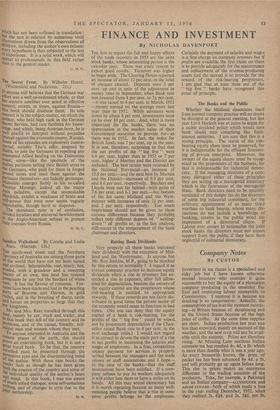FINANCE AND INVESTMENT
By NICHOLAS DAVENPORT
THE first to report the full and happy effects of the trade recovery in 1953 are the joint stock banks, whose accounting period is the calendar year. There was every reason to expect good results. Turnover was higher to begin with. The Clearing House reported an increase of about 12 per cent. in the total of cheques cleared. Deposits were 3 per cent. up and in spite of the adjustment in money rates in September, when Bank rate was lowered from 4 per cent. to 31 per cent. ---it was raised to 4 per cent. in March, 1952 —money earned on the average more last year than in 1952. While advances were down by about 6 per cent, investments were up by over 10 per cent. And, what is more important for the banks, there was no depreciation in the market value of their Government securities to provide for—as there was in 1952. In fact, the index for British funds was 7 per cent. up in the year. It is not, therefore, surprising to find that the net profits of the " big five " were 6.6 per cent. higher than in 1952 or 7 per cent. higher if Martins and the District are included. The best results were returned by the National Provincial—an increase of 15.8 per cent.—and the next best by Martins and the District—increases of 9.9 per cent. and 8.6 per cent. respectively. Barclays and Lloyds were not far behind—with gains of 7.6 per cent. and 6.1 per cent.—but bottom of the list came Midland and the West- minster with increases of only 21 per cent. and 2 per cent. respectively. Too much importance should not be given to these curious differences because they probably reflect only different degrees of " writing- down " of profits or, in the last analysis, differences in the temperament of the bank chairmen and directors.
Raising Bank Dividends
Very properly all these banks increased their dividends with the exception of Mid- land and the Westminster. Is anyone but Mr. Roy Jenkins, M.P., going to be shocked by this return to normality 7 I regard it as correct company practice to increase equity dividends when a rise in revenues has ex- ceeded a rise in expenses, after full allow- ance for depreciation, because the owners of the equity capital are the proprietors whose risk-bearing is entitled to appropriate rewards. If these rewards are not fairly dis- tributed in good times the private sector of the economy would cease to function in bad times. (No one can deny that the equity capital of a bank is risk-bearing, for the profits of the " big five ' could be wiped_ out by investment depreciation if the Chan- cellor raised Bank rate to 6 per cent. in the next exchange crisis.) I would not regard it as correct to devote the main part of a rise in net profits to increasing the salaries and wages of employees. In a free, competitive society payment for services is properly settled between the managers and the trade unions or staff associations and I hope— in the case of the banks—that the staff associations have been satisfied. If a com- pany refuses to pay its workers adequately it will either lose them or have a strike on its hands. All this may sound elementary but it is worth repeating because so many well- meaning people believe that a rise in com- pany profits belongs to the employees. Certainly the payment of salaries and wages is a first charge on company revenues but if profits are available the first claim on them is to provide adequately for the maintenance and replacement. of the revenue-producing assets and the second is to provide for the reward of the risk-bearing proprietors. 1 am glad that at least three out of the " big five " banks have recognised this point of principle.
The Banks and the Public Whether the Midland dissociates itself from normal company practice will no doubt be divulged at the general meeting, but last year Lord Harlech was at pains to argue for a stable dividend policy which would turn bank shares into something like fixed- interest securities. I am sure that this is a wrong principle. The status of the risk- bearing equity share must be preserved, for it is indispensable for the efficient function- ing of private, enterprise. Moreover, the owners of the equity shares must be recog- nised as the proprietors of the business, for that is indispensable for industrial democ- racy. If the managing directors of a com- pany disregard either of these principles they are setting up a managerial autocracy which is the forerunner of the managerial State. Bank directors need to be specially reminded of this danger (as do the directors of some big industrial combines), for the arbitrary appointment of so many titled worthies to bank boards, whose many dis- tinctions do not include a knowledge of banking, creates in the public mind the impression of a directorial clique. If Labour ever comes to nationalise the joint stock banks the directors must not expect support from the public if they have been neglectful of industrial democracy.


































 Previous page
Previous page